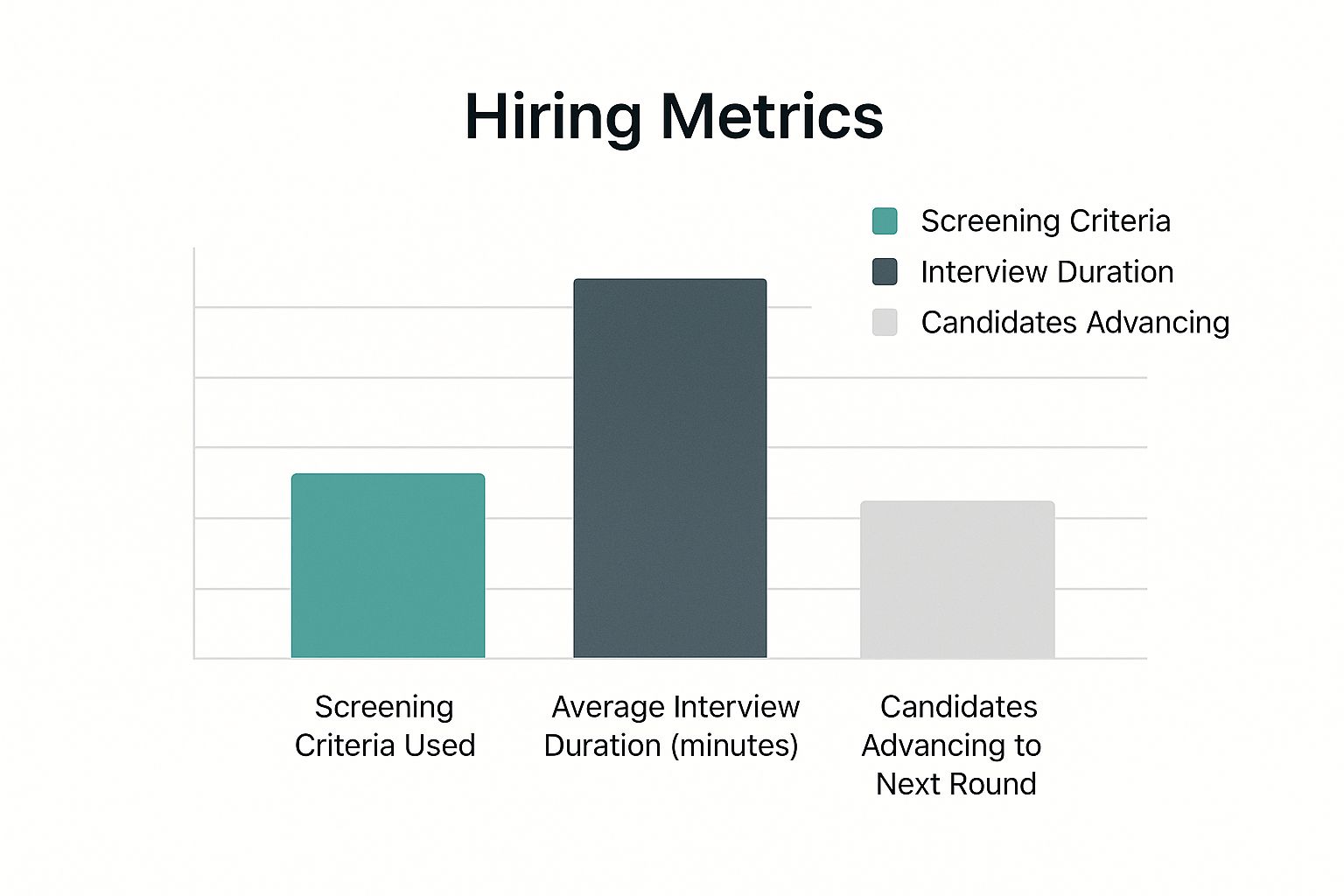Why the Right Cofounder Can Make or Break Your Startup
The solo founder journey is often romanticized. The reality, however, is much tougher. Building a successful startup is a huge undertaking, and going it alone can quickly lead to burnout. That's where finding the right cofounder comes in. It's not just about splitting the workload; it's about having support and resilience to weather the ups and downs of startup life.
A good cofounder brings many benefits beyond just sharing the to-do list. A complementary skill set can fill crucial gaps in your expertise. Maybe you're a tech expert but lack business skills. Partnering with someone strong in marketing or finance creates a balanced founding team. This generates synergy, amplifying your combined strengths for faster progress and greater innovation.
Having a cofounder also expands your network. This opens doors to new opportunities, potential investors, and valuable partnerships. A wider perspective leads to better decisions. Two heads are better than one when brainstorming, assessing risks, and tackling complex challenges. Over 150 million startups existed globally as of 2025, with around 50 million launching annually—that's about 137,000 new ventures every day. This competitive landscape highlights the need for complementary skills early on. Learn more: Find more detailed statistics here.
The Power of Shared Vision and Support
Besides practical advantages, a cofounder offers invaluable emotional support. The startup journey has exhilarating highs and crushing lows. Having someone to celebrate with and lean on during tough times helps maintain motivation and resilience. This shared journey builds understanding and trust, strengthening your working relationship and ability to overcome obstacles together.
Attracting Investors and Building a Strong Foundation
Investors often see strong founding teams as key to a startup's potential. A well-rounded team with diverse skills and a shared vision shows a greater chance of navigating challenges. This increased investor appeal can be crucial for securing funds and scaling your business.
Finding the right cofounder is about building a solid foundation for your startup. It's about creating a partnership that fosters innovation, resilience, and sustained growth. It's about finding someone who shares your vision and complements your strengths, so you can achieve more together. This foundation will be essential as you navigate the demanding, yet rewarding, journey of building a successful company.
Know What You Need: Mapping Skills Gaps Before Your Search

Before embarking on the search for a co-founder, it's important to understand your own strengths and weaknesses. This self-awareness is essential for finding a partner who complements your abilities and fills any expertise gaps. Building a successful startup is like assembling a complex puzzle; you need the right pieces to complete the image.
Identifying Your Strengths and Weaknesses
Begin with an honest self-assessment of your skills. Are you a tech expert? Perhaps a marketing specialist? Or maybe your expertise lies in finance? Clearly define your core competencies.
Then, identify your weaknesses. What areas challenge you? Where is your experience lacking? Recognizing these gaps is the key to finding a co-founder who brings those missing skills to the team. This process isn't about identifying shortcomings; it's about building a well-rounded and capable team.
Prioritizing Skills Based on Your Startup's Needs
Next, consider your startup’s current stage and its specific needs. A new startup might prioritize a technical co-founder to develop the initial product. A growing startup, however, might need someone with strong marketing and sales skills to expand its reach.
For instance, if your startup focuses on developing complex AI algorithms, a co-founder with deep technical expertise in artificial intelligence (AI) would be highly valuable. If you're building a consumer product, on the other hand, a co-founder with a background in marketing and branding might be more crucial.
Creating Your Ideal Co-founder Profile
By comparing your strengths and weaknesses against your startup’s needs, you can create a profile of your ideal co-founder. This profile should outline the essential skills, experience, and personality traits that would best complement your own and propel your business forward.
The goal isn't to find a copy of yourself. It's about finding someone who brings different strengths to the table. Just as a successful startup requires diverse skill sets, a successful founding team thrives on diverse perspectives and experiences.
For example, Dr. Matthew Leeper, Co-Founder and Managing Director of Education Evolved, used his PhD experience in history, applying the skills he developed in research and project management to his entrepreneurial venture. This example highlights how seemingly unrelated skills can be invaluable assets in a startup environment.
To find a co-founder with the right blend of skills and personality, you need more than a resume. You need a deep understanding of your own needs and the demands of your startup. Platforms like IndieMerger can connect you with verified founders who match your ideal co-founder profile. This saves you time and increases your chances of finding a successful partnership. This targeted approach ensures that you're not just finding a co-founder, but the right co-founder to help your startup flourish.
Where Exceptional Cofounders Actually Hang Out

Finding the perfect cofounder isn't a matter of luck. It's about strategically placing yourself in the right environments. This goes beyond simply posting on job boards. Think about where driven, like-minded individuals congregate.
Online Platforms for Cofounder Matching
Several online platforms are designed specifically to connect potential cofounders. IndieMerger is a prime example, utilizing AI-powered matching to pair verified founders with complementary skills. This streamlines the search process, allowing you to focus on building your startup. Other platforms, although perhaps less specialized, still offer valuable networking opportunities.
Niche Communities: Online communities focused on specific industries or technologies can be goldmines for finding potential cofounders. These platforms connect you with individuals who share your passion and understand the nuances of your field.
LinkedIn: A well-optimized LinkedIn profile can be a powerful tool for attracting potential cofounders. Clearly articulate your startup vision and the skills you seek in a partner. Actively engaging in relevant groups and discussions can significantly expand your network.
Social Media Groups: Participating in online forums and groups related to entrepreneurship and startups can be surprisingly effective. These groups offer a chance to discover potential cofounders and gain valuable insights into the startup world.
The Power of In-Person Connections
While online platforms offer convenience, in-person events foster deeper connections. Attending industry conferences, startup meetups, and hackathons allows for genuine interaction with potential cofounders in a dynamic setting. You can assess not only skills, but also personality and working styles.
Startup Weekends: Events like Startup Weekend bring aspiring entrepreneurs together to develop and pitch business ideas. These high-energy events offer a unique opportunity to observe potential cofounders in action, assessing their problem-solving skills and teamwork.
Industry Conferences: Industry-specific conferences allow you to connect with professionals who share your interests and possess relevant experience. These events often lead to valuable connections and insights into current industry trends.
Local Meetups and Networking Events: Local networking events and meetups specifically for entrepreneurs offer a chance to interact with local talent. You might just find a cofounder within your community.
To help compare your options, let's look at the various channels for finding a cofounder.
Top Cofounder Sourcing Channels Comparison
A comparison of different platforms and venues for finding potential cofounders, with insights on their effectiveness for various founder types.
| Sourcing Channel |
Best For Finding |
Success Rate |
Time Investment |
Key Approach |
| Online Platforms (IndieMerger, etc.) |
Founders with specific skill needs, remote cofounders |
Moderate to High (depends on platform and engagement) |
Low to Medium |
Algorithmic matching, direct outreach |
| Niche Online Communities |
Founders in specific industries or tech stacks |
Variable (depends on community activity) |
Medium |
Engaging in discussions, demonstrating expertise |
| LinkedIn |
Experienced professionals, industry connections |
Medium |
Medium to High (building a strong network takes time) |
Profile optimization, networking, direct outreach |
| Social Media Groups |
Early-stage founders, general networking |
Low to Medium |
Medium |
Active participation, building relationships |
| Startup Weekends |
Founders looking for quick validation, action-oriented individuals |
Medium |
High (short bursts of intense activity) |
Project-based collaboration, observing performance |
| Industry Conferences |
Experienced professionals, industry-specific connections |
Medium to High |
High (travel and event attendance) |
Networking, attending talks, following up |
| Local Meetups & Networking Events |
Local talent, community connections |
Variable (depends on local ecosystem) |
Low to Medium |
Attending events, building relationships |
As you can see, each channel offers different benefits and requires varying levels of time commitment. Choosing the right mix of platforms and approaches is crucial.
Crafting Effective Outreach Messages
When you’ve identified potential cofounders, crafting a compelling outreach message is key. A generic message won't suffice. Personalize your outreach, showing genuine interest in their work and highlighting shared interests or visions. Clearly articulate your startup's value proposition and what you seek in a partner.
Dr. Matthew Leeper, Co-Founder and Managing Director of Education Evolved, applied skills from his PhD to his entrepreneurial venture. This example highlights the importance of networking and recognizing transferable skills. Be open-minded and consider potential partners from diverse backgrounds. Finding the right cofounder is an investment in your startup’s future. Explore these avenues thoroughly and connect with individuals who align with your vision and commitment to success. Building a strong co-founder relationship requires strategic effort and authentic connection.
Beyond The Resume: Truly Vetting Potential Partners

Finding a potential co-founder with an impressive resume is just the first step. The real key to a successful partnership lies in thoroughly vetting potential partners. This ensures everyone is on the same page regarding core values, work ethic, and the overall vision for the company. This process goes beyond surface-level interviews and utilizes strategies employed by successful founding teams.
Assessing Capabilities Through Real-World Tests
One effective vetting method involves real-world test projects. These projects, tailored to the specific skills needed for your startup, provide valuable insights into a potential co-founder's practical abilities. For a technical co-founder, this could be a small coding project. A marketing co-founder might develop a marketing strategy for a hypothetical product. These tests reveal not only skills but also problem-solving approaches, work style, and communication patterns.
Structured reference checks are also crucial. Don’t just ask for references; prepare specific questions. Delve into the candidate’s strengths and weaknesses, and how they perform under pressure. Inquire about their team experience and ability to navigate challenges. This offers a more complete picture than a resume alone.
Trial Periods and Hypothetical Scenarios
A trial period, where the potential co-founder works on a limited-scope project, can provide valuable data on compatibility. This "test drive" lets you observe work habits, communication style, and overall team fit. It also gives the potential co-founder a realistic preview of the working relationship.
Discussing hypothetical scenarios can be equally illuminating. Present realistic business challenges and ask how they would approach them. This unveils their thought process, problem-solving abilities, and alignment with your values. It also opens a dialogue on management styles, business development, and team building strategies.
Evaluating Crucial Interpersonal Dynamics
Beyond skills and experience, interpersonal dynamics are essential. Successful founders assess conflict resolution patterns, communication styles, and stress responses before formalizing partnerships. How does the potential co-founder handle disagreements? Are they open to feedback? How do they react under pressure?
These factors significantly impact the long-term health and success of the partnership. Understanding these dynamics early on can prevent future issues. This focus on compatibility, along with careful consideration of equity, is crucial for long-term success.
Founder equity retention, for instance, is a critical negotiation point. Experts recommend retaining over 60% pre-IPO. However, funding rounds dilute ownership, highlighting the importance of vesting schedules. Vesting mitigates risks from co-founder departures, a factor in 23% of startup failures. Explore this topic further: Find more detailed statistics here. By incorporating these vetting strategies, you move beyond the resume. You’ll find a co-founder who isn’t just skilled, but a true partner in building a successful and sustainable venture.
Setting the Rules of Engagement: Equity, Roles & Expectations

Finding the right co-founder is like finding the perfect business partner. Once you've found them, building a solid foundation for your venture is essential. This foundation relies on clear agreements about equity, roles, and expectations, established right from the start. These initial agreements are the cornerstone of a successful co-founder relationship, helping to prevent misunderstandings and conflicts later on.
Equity Splits: Balancing Fairness and Contribution
One of the most crucial discussions revolves around equity. How will ownership of the company be divided? An equal split is common, particularly in early-stage startups, reflecting a shared commitment.
However, factors like prior experience, capital contributions, and anticipated roles can lead to a more nuanced split. In 2025, almost half of two-founder teams (45.9%) opted for equal equity splits. This highlights the emphasis on fairness, especially in tech-driven markets. However, after seed funding, median ownership often drops to 56.2% due to investor stakes and advisor shares. Learn more about equity trends: Discover more insights about co-founder equity.
It’s important to remember that equity discussions are not a one-time event. Vesting schedules, which link equity ownership to continued contribution over time, are standard practice. These schedules protect all founders if someone leaves the venture prematurely. They also encourage long-term commitment to the company’s success.
The data chart below visualizes common equity split scenarios in two-founder teams. The chart compares different models based on factors such as initial contributions, projected roles, and long-term commitment.
- Data Chart (Bar Chart): Equity Split Scenarios for Two-Founder Teams
- Scenario 1: Equal Split (50/50)
- Scenario 2: Founder A (60%), Founder B (40%) - Reflecting higher initial capital contribution from Founder A.
- Scenario 3: Founder A (55%), Founder B (45%) - Founder A takes on CEO role with increased responsibilities.
The chart highlights how various factors can influence the final equity split, demonstrating the importance of considering contributions beyond just time commitment.
To further explore different equity split models, let's examine this comparison table:
Cofounder Equity Split Models
This table compares different equity allocation approaches, outlining their advantages, disadvantages, and ideal use cases.
| Split Model |
Description |
Advantages |
Disadvantages |
Best For |
| Equal Split (50/50) |
Each founder receives equal ownership. |
Simple, fosters sense of partnership. |
May not reflect unequal contributions. |
Early-stage startups with equal contributions. |
| Experience-Based Split (e.g., 60/40) |
Allocates equity based on experience and expertise. |
Rewards valuable skills and knowledge. |
Can be challenging to quantify experience fairly. |
When one founder has significantly more experience. |
| Contribution-Based Split (Variable) |
Equity is tied to capital contributions, time commitment, and role. |
Flexible and reflects individual input. |
Requires careful negotiation and agreement. |
Startups with varying levels of founder involvement. |
This table provides a framework for founders to discuss and negotiate equity splits, ensuring fairness and alignment with contributions.
Defining Roles and Responsibilities
Clear role definition is also vital. Who will be the CEO? Who handles marketing? Who oversees product development? While titles are important, clarifying responsibilities is key. This ensures efficient task distribution and a shared understanding of individual contributions.
A well-defined structure promotes autonomy and accountability. Each founder has ownership over their area of expertise, driving progress and a sense of responsibility. However, these defined roles should not restrict collaboration. Open communication and flexibility are essential for navigating the ever-evolving business landscape.
Establishing Clear Expectations and Communication
Beyond formal agreements, setting clear expectations about work ethic, commitment, and communication is paramount. How many hours per week are expected? How will decisions be made? What are the communication channels for updates and discussions? Addressing these seemingly small details can prevent future miscommunication and friction.
Establishing regular check-in meetings and feedback mechanisms is beneficial. These create a space for open dialogue, addressing concerns before they become major issues. They also provide a chance to celebrate successes and reinforce the shared vision. Like Dr. Matthew Leeper, Co-Founder of Education Evolved, founders often apply skills from diverse backgrounds to their ventures.
By establishing these fundamental agreements early on – through open conversations and clear documentation – you create a strong foundation for a productive co-founder relationship. This clarity sets the stage for a collaborative and successful journey, increasing the likelihood of navigating the challenges of startup life and achieving shared goals.
Building Resilient Partnerships That Survive the Journey
Finding the perfect co-founder can feel like winning the lottery. You've got complementary skills, a shared vision, and the energy to conquer the world. However, even with the best initial match, challenges will inevitably arise. Building a truly resilient partnership requires more than just a good starting point; it requires proactive communication and strategies to navigate the often turbulent waters of startup life.
Establishing Strong Communication Systems
Open and honest communication forms the bedrock of any successful co-founder relationship. This means establishing clear communication systems from the outset. Regularly scheduled check-ins provide a dedicated forum for discussing progress, addressing concerns, and ensuring everyone stays aligned.
These check-ins shouldn't solely focus on tasks and milestones. It's equally important to discuss the emotional and mental well-being of each founder. The startup journey is demanding, and supporting each other through the ups and downs is crucial. Additionally, implement clear feedback mechanisms to encourage constructive criticism and open dialogue without fear of judgment.
Preventing Conflict and Maintaining Respect
Conflicts are a natural part of any partnership. However, implementing effective conflict prevention strategies can minimize their frequency and intensity. One key strategy is to establish clear decision-making protocols early on. This clarity helps avoid misunderstandings and power struggles, especially during high-pressure situations.
For example, clearly defining who has the final say on specific decisions, such as product development or marketing strategies, can prevent disagreements from escalating into major conflicts. When conflicts do arise, resolution techniques that prioritize mutual respect are essential. Active listening, empathy, and a willingness to compromise are vital for maintaining a healthy and productive relationship.
Distributing Leadership and Maintaining Solidarity
Effective co-founder partnerships distribute leadership responsibilities based on individual strengths. This not only avoids burnout but also allows each founder to focus on areas where they excel. One founder might be a project management whiz, leveraging skills honed during their PhD research, while the other excels at sales and building partnerships.
This distribution also fosters a sense of shared ownership and accountability. However, even with clearly defined roles, maintaining solidarity during challenging times is paramount. Just as a ship's crew must work together to navigate a storm, co-founders must present a united front, supporting each other and reinforcing their shared commitment to the vision.
Regular Partnership Health Assessments
Just as we schedule regular health checkups for our physical well-being, regular “partnership health assessments” are crucial for a thriving co-founder relationship. These assessments can be informal conversations or more structured reviews. The goal is to proactively identify and address potential issues before they escalate into major problems.
This early intervention allows for course correction, ensuring the partnership remains strong and resilient. Finding a co-founder isn't just about filling skill gaps; it's about finding a partner who understands the emotional demands of the startup journey. Platforms like IndieMerger recognize this need, connecting founders based on shared visions and values. This shared foundation sets the stage for building truly resilient partnerships that can withstand the inevitable challenges of building a business.
When It's Not Working: Recognizing Partnership Red Flags
Even with careful vetting and the best of intentions, co-founder relationships can sometimes break down. Recognizing the warning signs of a failing partnership is essential for safeguarding your startup. This means understanding the difference between the typical challenges of a new venture and deeper incompatibilities that threaten its very survival. Identifying these red flags early can save you time, resources, and a lot of stress in the long run.
Identifying Fundamental Misalignment
One key indicator of trouble is a consistent misalignment of vision. While minor disagreements are normal, fundamental differences in the company's long-term direction can cause significant friction. For instance, if one co-founder envisions rapid growth through aggressive marketing, while the other prioritizes slow, sustainable growth, this core difference in approach can lead to constant conflict.
Another red flag is a persistent lack of communication, or an unhealthy communication style. Open communication is the bedrock of any healthy partnership. If co-founders are constantly arguing, avoiding difficult conversations, or lacking transparency in their communication, it can erode trust and impede progress.
Recognizing a Toxic Partnership Dynamic
Sometimes, a partnership can become toxic, negatively impacting both the business and the individuals involved. Signs of this include consistent disrespect, a lack of trust, and a pattern of undermining each other's efforts. This negative dynamic can quickly create a poisonous work environment, damaging team morale and productivity. For example, if one co-founder consistently dismisses the other's ideas or takes credit for their work, it fosters an unsustainable and toxic environment.
Another warning sign is a significant imbalance in workload and commitment. Building a startup demands significant dedication. If one co-founder consistently carries the majority of the workload while the other is disengaged or unreliable, it can breed resentment and hinder progress. This imbalance can also originate from a fundamental misalignment of work ethic and commitment to the venture's success.
Addressing Difficult Conversations and Seeking Mediation
Addressing these issues requires difficult, but necessary, conversations. It's important to approach these discussions with honesty and a willingness to listen. Clearly articulate your concerns and focus on specific behaviors rather than personal attacks. Sometimes, an objective third party can be helpful. Mediation can provide a structured setting for resolving disagreements and charting a path forward. A skilled mediator can help co-founders communicate effectively and explore potential solutions.
Navigating Partnership Breakups and Minimizing Damage
If the partnership is beyond repair, knowing how to execute a clean break is crucial. This minimizes damage to the business, team morale, and investor relationships. This involves addressing legal and financial matters, such as equity distribution and ownership of intellectual property. Unwinding a partnership can be complex, often requiring careful planning and potentially legal counsel. The goal is to separate in a way that protects the interests of all parties involved and allows the business to continue operating.
Dr. Matthew Leeper, co-founder of Education Evolved, navigated the challenges of leaving academia to start his own business. He emphasized the importance of considering your values and skills when making a career change. This entrepreneurial journey demonstrates the importance of adapting and leveraging your expertise in new settings. Similarly, navigating a co-founder breakup requires adaptability and a focus on the future of the business. By recognizing red flags and addressing them proactively, you can protect your startup and increase your chances of success, even if the original partnership doesn't last.
Are you looking for a co-founder who shares your vision and complements your skills? Find your ideal co-founder with IndieMerger, the platform that connects verified founders for successful partnerships.